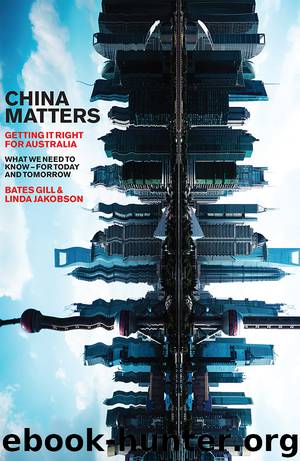China Matters by Bates Gill

Author:Bates Gill
Language: eng
Format: epub
Publisher: Schwartz Publishing Pty. Ltd
Overseas Chinese communities
The more than 50 million ethnic Chinese living outside of China form the world’s largest diaspora. In the 2011 Australian census, Chinese ancestry either alone or with another ancestry was claimed by over 866,000 individuals. Today that number would be more than 1 million. According to the Australian Bureau of Statistics, as of 2015, approximately 482,000 of them, or 2 per cent of the Australian population, were born in mainland China. That makes mainland China the third-largest foreign source of Australian residents after the United Kingdom and New Zealand.
As James To, a researcher in New Zealand, thoroughly documents in his book Qiaowu: Extra-Territorial Policies for the Overseas Chinese, the Party has long sought to engage and influence this community in order to improve China’s foreign image and to advance Chinese policy preferences. The channels of influence are palpably evident. As noted above, the PRC has extensive influence over the content of most Chinese-language media in Australia. In addition, PRC officials enlist ethnic Chinese businesspeople to causes serving China’s interests. For example, in early 2016, a number of Australian-Chinese business leaders called upon Prime Minister Turnbull to avoid raising the South China Sea when he travelled to China in April that year.10 PRC officials conduct surveillance of and at times threaten Chinese international students in Australia through PRC-controlled student organisations and attempt to pressure and muzzle ethnic Chinese critical of the PRC.11 Top Chinese leaders have explicitly called on all ethnic Chinese overseas, without distinguishing between PRC and foreign citizens, ‘to unite as many people as possible to propel China’s reform, opening up and modernization drive, and to rally them behind President Xi Jinping’s call to achieve the Chinese dream’.12
But such efforts have always been a thorny problem for Beijing. In the 1950s and 1960s, owing to a mix of racial, political and ideological fears, Chinese abroad were often vilified as fifth-column supporters of Communist China. This problem was particularly acute in parts of South-East Asia. Hence, the Party had to engage cautiously with overseas Chinese to avoid setting off an anti-China backlash. To this day, Chinese authorities still risk the same accusations, especially as the number of PRC nationals and émigrés around the world continues to grow.
In the early decades of the PRC, Beijing’s cultivation of the Chinese diaspora was an important element in its contentious diplomatic struggle with the Republic of China (Taiwan). With China’s post-1978 emergence on the world stage and Taiwan’s steady marginalisation – today fewer than twenty governments around the world have official diplomatic relations with Taiwan – this part of Beijing’s overseas Chinese strategy has become less critical.
The effort to engage and influence Chinese overseas sits uncomfortably with Beijing’s professed opposition to interference in the internal affairs of other states. Nevertheless, the engagement and mobilisation of overseas Chinese are important elements in Beijing’s foreign policy strategy overall and in its soft power in particular. Through messaging that emphasises Chinese ethnic affinity, cultural longevity, historical achievements and pride in the country’s re-emergence as a
Download
This site does not store any files on its server. We only index and link to content provided by other sites. Please contact the content providers to delete copyright contents if any and email us, we'll remove relevant links or contents immediately.
| Anthropology | Archaeology |
| Philosophy | Politics & Government |
| Social Sciences | Sociology |
| Women's Studies |
The Secret History by Donna Tartt(19090)
The Social Justice Warrior Handbook by Lisa De Pasquale(12190)
Thirteen Reasons Why by Jay Asher(8912)
This Is How You Lose Her by Junot Diaz(6887)
Weapons of Math Destruction by Cathy O'Neil(6281)
Zero to One by Peter Thiel(5802)
Beartown by Fredrik Backman(5755)
The Myth of the Strong Leader by Archie Brown(5508)
The Fire Next Time by James Baldwin(5446)
How Democracies Die by Steven Levitsky & Daniel Ziblatt(5219)
Promise Me, Dad by Joe Biden(5154)
Stone's Rules by Roger Stone(5088)
A Higher Loyalty: Truth, Lies, and Leadership by James Comey(4964)
100 Deadly Skills by Clint Emerson(4926)
Rise and Kill First by Ronen Bergman(4789)
Secrecy World by Jake Bernstein(4753)
The David Icke Guide to the Global Conspiracy (and how to end it) by David Icke(4720)
The Farm by Tom Rob Smith(4514)
The Doomsday Machine by Daniel Ellsberg(4490)
